|
press プレス |
|
The Grey Zone DJ Sprinkles - Conor McTernan and Christian Murphy |
In Hyponic (UK), August 2 2014. Photography by Jordan Troy.

Better known by his/her production alias Dj Sprinkles, Terre Thaemlitz runs the Comatonse Recordings record label has won accolades for the album "Midtown 120 blues”, the longest album of all time, "Soulnessless", and the politically challenging, deep and ambient House music she has been releasing under various pseudonyms since the early 90's.
Born and raised in Misourri, USA Terre cut her teeth in Manhattan's transexual clubs during the 80's a time when Disco and dance music was heavily associated with queer culture. Today she lives in Kawasaki, Japan and has done so for well over a decade and considers it her adoptive home. A pansexual and transgender activist, Terre is always willing to talk at length about queer theory, gender politics and sexuality in the modern club scene & she regularly contributes to talks & lectures on these subjects.
We spent an deeply insightful afternoon with Terre in Dalston, London a couple of weeks ago for an in-depth discussion on how theme and context are more important than sound, why she creates conceptual foregrounds in her work, the concepts behind her electro-acoustic Soulnessless live project, transgender politics and the current state of affairs in Japan...
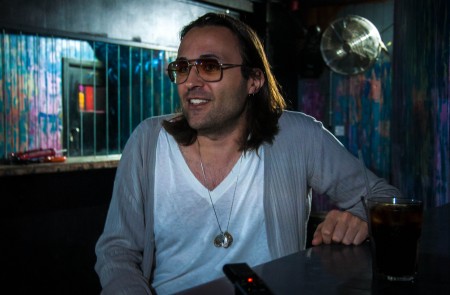
As a starting point, you've recently made the switch from DJ'ing with CD's to portable USB sticks. Was this an easier decision than switching from vinyl whenever you did so?
The decision to stop carrying vinyl around was made really simple for me when I threw out my back. On my 39th birthday I literally woke up paralyzed. I had a slipped disk, so you can't carry stuff after something like that. Since the nineties I've tried to digitize the tracks I like best, but now I methodically digitized my House, Soul and Disco vinyl from A-Z regardless of whether they are good or bad records. But even carrying around CD's can be a pain. Now that I have all the files prepared, and with luggage weight requirements while travelling overseas, I decided to switch to USB. If you can get rid of three kilos it's definitely to your advantage. I actually played my first USB gig here in London at Corsica Studios in May.
Are you still buying records?
It's one of those Catch-22's where you start digitizing all your vinyl and then you get into the format. Even though I was digitizing to get rid of some shit I didn't need, I've actually bought a few things recently. But I've made it a rule that if I buy something I'll force myself to digitize it, which of course is a time requirement. So I really think about that before I buy something now.
Talking about CD's, you recently re-issued ‘Midtown 120 Blues' in May, what was the thinking behind this decision, was it motivated by public demand?
Public demand might be an overstatement. I knew some people wanted to get hold of it, and my licensing deal with Mule Musiq was up. I always wanted to re-issue it with slightly different packaging and do a smaller release.
Who provided the painting used for the artwork?
That's Laurence Rassel, a Belgian cyber-feminist that I did an electro-acoustic radio drama with called "The Laurence Rassel Show" - There was also a dance remix off that - the ‘Useless Movement' EP. I'm actually doing a public talk with her and Griselda Pollock in Leeds next week. Both of the talks were arranged through Mark Fell (friend and collaborator).
To speak on studio production. Do you often find yourself finishing works in one sitting, or do you leave things and come back to them or sometimes abandon a track altogether?
It's rare for me to abandon things entirely, but mid-process I may abandon everything I've done up to that point and start over. I'll normally work on one track at a time and take a couple of days to a week or more on it, depending on what else is happening in my schedule.
It seems like there's an increased pressure to deliver a consistent amount of content/output all the time. How do you reconcile this pressure with your own desire to be fiercely independent and move at your own pace?
For me it's simply that I can't really work fast. I'm quite slow in the studio, part of that is that I'm not a musician in a formally trained sense. I have trained myself, like a lot of people in electronic music. I'm not an improvisationalist or a knob-tweaker. I can't just jam out a track or whatever, so that automatically sets the preconditions for my production time.
You often create a hurdle in relation to how accessible your work is. For example the navigation of your website or the various formats of your releases, in an effort that those who are willing to seek it out will do so on their own accord. Do you think that this is something that should be applied other different forms of media today with the amount of ‘churnalism' we encounter on a daily basis?
It cannot be applied to mass media, It's a reaction against populism in the homogenizing sense. It's not anti-populist in an elitist, snobby kind of way. It's anti-populist in terms of rejecting the homogenization that mainstream media goes through when it tries to reach as many people as possible. That's not my goal, and I can't even have the conversations I'm trying to have if I'm trying to boil everything down to a remedial, 101 beginner's lesson on gender or sexuality, etc.
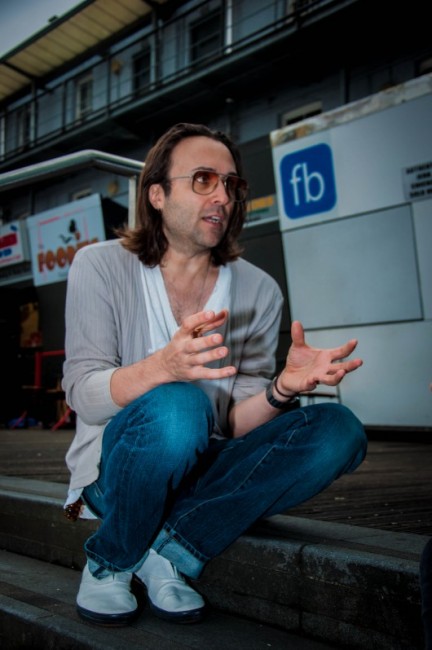
Your website and a lot of your work has conceptual foregrounds...
Theme is more important to me than sound, I don't really care about music. I care about themes and topics and what certain types of media represent historically and contextually. That's where things get their meaning for me. It's not just like "this sounds great." It's really because of things like the context that gave rise to a certain genre, what has happened to it over time and how have our social relations changed and altered around it, how can we engage with that and does it still have relevance? I've never been this kind of producer who, for example, was doing electro-acoustic stuff or even the deep house stuff and thinking, "Oh, it would be so awesome if everyone in the world was listening to this music." That would be a fucking nightmare! If that was the case I would immediately have to stop producing that stuff because my whole connection to those genres rests in how they emerged in opposition to Pop.
When you say you're more interested in themes and context, I assume you apply that to other forms of media you take in. Is there ever a point when you personally feel you don't need to engage with something, that you can just appreciate it on a superficial level, is that of any interest to you?
There's music that I enjoy privately that I would be ashamed to tell you about. If that answers your question, then of course! We all build up these esoteric, fetishistic relationships and tastes as music collectors. There are also ways in which those things can be twisted and subverted. For example, a lot of the drag shows I used to DJ for in the 80's and 90's used really camp or shit Pop music that I just hated to death, but somehow if there's some twist in the lyrics, if some femme love song is being sung by someone with a cock, then suddenly there's a change in how it functions. This is also about the context of queer clubs, of gay nightlife, etc. Most straight people listen to Disco with a straight ear. They hear "him and her" songs as being about a man and a woman. In a gay club, the "him and her" is understood to be two men. This is where context becomes important.
Obviously you hold a great stock in counterculture and all the queer movements associated with that, Do you think that on the surface level there appears to be more acceptance of queer lifestyles?
I think there's a distinction between queerness in the political sense and just LGBT acceptance. The kinds of homosexuality or transgenderism that are accepted are always those that are reconciled with neo-liberal agendas of family - just "good, normal people" who want to have regular lives like everyone else, like the gay couple from the TV show ‘Modern Family'.
Queerness is not simply about homosexuality. It's about a kind of an interstice or position between identities. In the hetero-homo paradigm the metaphor would be if hetereosexuality is white and homosexuality in black, queerness is about all the greys between. Most of us tend to swing more one way or the other and kind of essentialise or naturalise our relationships to that direction we socially exist in, but I think at the end of the day, you know, a mouth is a mouth, it doesn't matter who's it is. Queerness is about getting away from the hetero/homo paradigm, and that's critical when thinking about sexuality and transgenderism because the whole hetero/homo thing relies on the identification of your gender opposite and if you can't do that you don't know which you are. If you're trans identified then both heterosexuality and homosexuality instantly become nothing more than performance.
How does one find spaces that allow for the open enactment of kinds of sexuality or perversions that wouldn't fit into either dominant hetero-normative activity or the LGBT neo-liberal Pride reconciled models?
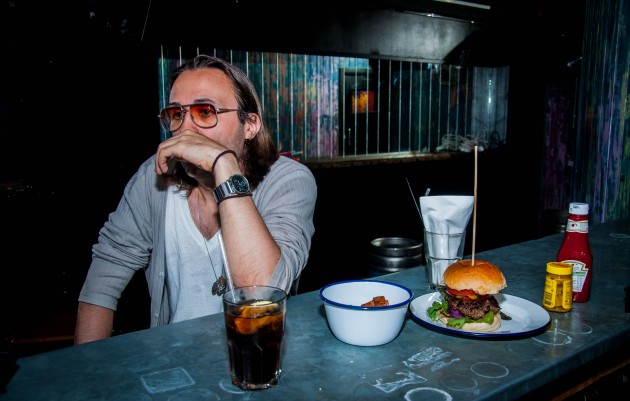
Mainstream acceptance is always linked to domination. For every model of acceptance there are others that are being excluded. Now it's the trendy thing for young kids to be taking hormones to start gender transitioning, sometimes in elementary school. That's something that's really stupefying for me as someone who really struggles to have a non medically mediated relationship to my body as a transgender person. It means those children are being pushed into reconciling with being a "boy" or "girl," rather than being allowed to foster understandings of something other-than-boy-or-girl that is not branded as a "defect." And the reason is simple. Those understandings could present a serious challenge to patriarchies, which depend upon binary gender socialization.
For example, in most of the world, most sex between two people with cocks doesn't happen between self actualised, "out loud and proud" Gay men. Maybe one of the of those people is some kind of out femme queen and the other person is "straight" with a wife and kids at home - you know what I mean? So this is how sex between "men" happens, and this is left out of the whole Pride discourse because this sort of reality is taboo to discuss in the West now. It's only something to be ashamed of, and socially isn't accepted anymore. ‘The Closet' is not something that the West is willing to defend as a site of self defense and protection anymore. Its only understood as a self-destructive position of shame - and this is dangerous, you know?
You featured in Resident Advisor's Real Scenes short on Tokyo - did you consider this to be an accurate representation of what it was like at the time? I saw you pointed out that because of the fueiho (no dancing) laws that the sex workers and dancers were being made more vulnerable.
The sex workers were, the dancers weren't at all.
Okay, well in May obviously it was announced that these laws were being loosened in an effort to boost tourism. Could you shine some light on the current situation then as you see it?
Yeah well I think what's happening is basically Japan got the Olympics in 2020, and they're trying to convert the nation to being more tourist friendly between now and then. Of course, dancing is normal for people in most of the world - particularly those who have the money to travel to Japan, likely Westerners coming from nations where they would dance all night and stuff. So its inevitable that Japan would adjust their laws so tourists can come and party, but this is a change that's rooted in a distancing or lack of concern for what the fueiho laws and the morality code actually mean for the people who are left underneath those codes.
The main argument that those in the pro dance movement have been making is that they're not these perverted people who are doing bad things. In a way its like the modern LGBT Pride argument that says, ‘hey we're just good people trying to get our groove on, we're just want to relax at the end of the day, we're not doing anything scandalous'
So they're rationalising it in establishment terms?
Yeah, its very neo liberal - and if the people aren't actually middle class they're very middle class oriented. It's a very straight movement that is just wanting to cut out the bit about clubs from the morality code. As for the rest of the code - ‘that can stay as it is, we don't need to worry about that'. The really frightening thing is that, I guess its been about four years since the police started cracking down in the clubs, and since then this pro-dance movement picked up and within four years the law is getting changed. Meanwhile, ten years before that police were raiding certain safe spaces for sex work and causing problems for the sex workers. Obviously a lot of it is kind of Yakuza bullshit, but some of it is about sex workers working together, sharing experiences, learning how to protect themselves, these sorts of things - that information gets exchanged between people when they meet in spaces physically. Since those shutdowns of spaces for sex work around fourteen years ago, female sex workers increasingly began freelancing it on the internet - just meeting johns at Love Hotels and going there by themselves without any protection or back up. This has resulted in a real increase in violence against female sex workers - instances of rape, instances of physical abuse, instances of verbal abuse, non payment for labour, that kind of stuff.
All of these things were happening for ten years, and the club scene couldn't give a fuck. Then cops came in and told them they couldn't dance and suddenly everyone's like, ‘Oh my god, we've gotta change this law!'. You can tell I'm upset right now. I mean, like, fuck you! What the fuck is wrong with people? I don't get it, its so fucking crass.
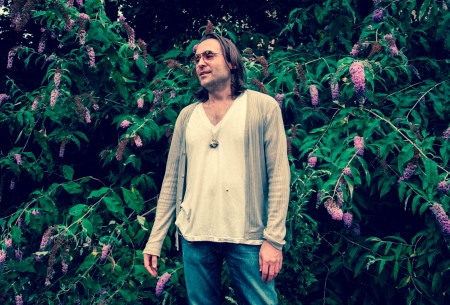
I understand that you're going to be doing a ‘Soulnessless' live tour - am I right in saying that?
I've been doing shows around ‘Soulnessless' since before it's release, because I was working on it for four years - so even within that time when I'd finished one section I started performing it, sometimes in relation to exhibitions. The curators Pierre Bal-Blanc and Dean Inkster involved me in some of their projects by having me perform pieces, and there was also actually a full solo museum exhibition around it at CAC Brétigny with installations of the video and audio works, as well as some physical pieces.
I'm doing some more performances next year in Lucerne and Basel. I really enjoy doing that sort of stuff more (than DJ-ing), if only because the level of time and effort put into a project like Soulnessless is so much greater than the time and effort put into the production of House tracks.
And these shows - will they be in a club space or will they be more of a sit down audience thing?
Definitely a sit down audience thing. I mean it's a very time consuming, kind of slow and intense piece. The piece itself deals with critiques of spirituality and religion, and particularly how they're perpetuated through the audio market place. Actually the video-audio performance of it is modelled after cult indoctrination films, and this idea of being bombarded with endless information that you can't get out of - a lot of text, a lot of imagery.
In terms of the live set up of it could you give us a little run down? I've heard you play all the piano keys with your left hand as a metaphor for the left political perspective?
The Canto V performance is based on this 32 Hour Piano piece, ‘Meditation On Wage Labor And The Death Of The Album'. The time requirement on that performance is that it has to be longer than 81 minutes so that any recording of it would be forced into the realm of the MP3. The reason that piece is so long is to fill up a single 4GB maximum file size fat32 320kbps MP3, which is about 29 hours 42 minutes. It's asking what is an album in the MP3 era? Instead of the album being an hour long project for quick download or whatever, if you actually think about how the ‘album' as a term emerged, it originally referred to playback duration. Vinyl Records used to be 18 to 20 minutes per side before you get serious sound degradation, so that's why albums from the 70's are usually 35 to 40 minutes long, to fill the A and B side of a 12-inch record. Then the CD came along and album length went up to 74 minutes, then 80, and we're now asked to produce the CD plus digital online exclusives, podcast mixes for websites, and so on.
As producers we're required by the industry to generate even more and more media with even less and less advances - this for me is a real labour crisis in the industry that nobody is talking about. So I wanted to see, on a material level, what is an MP3 album? On traditions of playback duration being what has defined the album in different eras, what is it in this era? I produced it in 2008, before 64-bit OS's, so there was still the FAT32 4GB file size limitation. That's why I worked with that. I guess today it would be, what,16GB? But even today a lot of applications running on 64-bit OS' still can't open the 4GB file. But Windows Media Player and iTunes can figure it out.
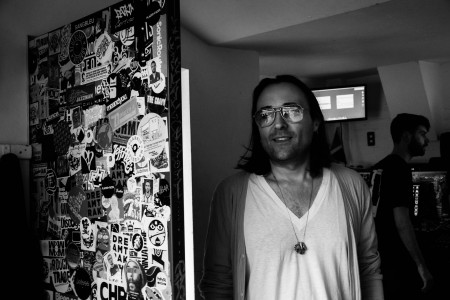
The live performance of Canto V, then, is acoustic piano. Its a very minimalist kind of Cage-ian piece.
I was recording it in the academic setting of York University, and this Cage-ian, modern new music format is what I went with. The accompanying text is a pretty blunt critique of the social and economic dynamics behind academic electroacoustic music scenes. And yeah, it's played all with the left hand as a metaphor for labor from the left.
We've gone in pretty deep on a lot of things so I'd like to conclude on a slightly lighter tangent by asking you what you do to relax outside of music? Do you have any hobbies?
I love long walks on the beach, chocolate milkshakes with two straws so they can be shared with a lover, and Air Supply.